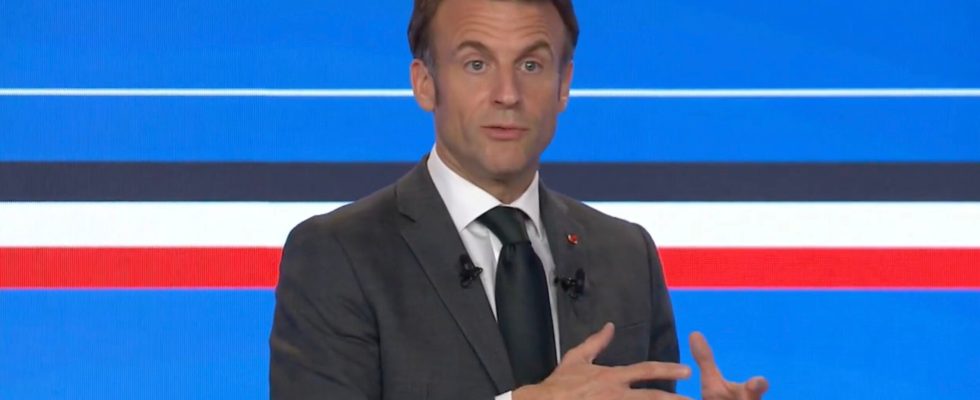During a speech aimed at unveiling his strategy to “stimulate” the “reindustrialization” of France, Emmanuel Macron announced a modification of the ecological bonus. The latter, awarded when purchasing an electric car, will now be calibrated to “take into account the carbon footprint” linked to their production, with the aim of favoring vehicles designed in Europe.
Let’s set the scene: since January, Tesla has decided to lower the prices of its flagship models, the Model 3 and Model Y, thus offering excellent value for money. The entry-level models are all eligible for the ecological bonus. The vehicles “imported“, such as the MG4 and the Model 3, are therefore among the best-selling electric cars in France. This does not please European manufacturers who are struggling to compete with this downward price trend.
The ecological bonus in France is supposed to support buyers of electric vehicles by giving them a little financial boost. However, the problem arises when this bonus benefits vehicles designed outside Europe. For example, the Tesla Model 3 and MG4, which benefit from this bonus, are made in China.
Emmanuel Macron launches a reform of the ecological bonus for electric cars
As expected, Emmanuel Macron has decided to reform the ecological bonus for electric cars. Why, then ? For “consider the carbon footprint » of their production and promote vehicles manufactured in Europe. A seemingly laudable reasoning, but which suggests a hint of sarcasm, as if the car manufacturers of the rest of the world were polluting the atmosphere at all costs, while our European manufacturers were the only ones trying to reduce their carbon footprint.
Accelerate our industrial recovery. https://t.co/satR2IQqNV
—Emmanuel Macron (@EmmanuelMacron) May 11, 2023
Emmanuel Macron’s ambition is to make France “the first European country to revise the criteria for granting the car bonus within the framework of the bill, in order to better integrate the carbon footprint linked to the production of the vehicle and so that public aid is specifically directed towards these objectives. “.
Emmanuel Macron did not forget to mention that this is not protectionism. Instead, he suggests that French taxpayers’ money should not be used to “accelerate non-European industrialization“. Emmanuel Macron has therefore announced that the criteria for awarding this reformed ecological bonus will be defined as “here the end of the year“. Bercy says it has developed a model to assess the carbon footprint of building a vehicle, “from battery to motor construction“.
Manufacturers will therefore have to prove that they meet these ecological criteria required to be able to benefit from the ecological bonus.Emmanuel Macron
In theory, they therefore planned to consider the environmental aspect of the battery in their evaluation. However, it is hoped that their analysis is not limited to the final assembly of the product, but also encompasses the place of production. This could ensure a more accurate and meaningful assessment of the vehicle’s overall carbon footprint, thus more accurately reflecting actual sustainability efforts.
This measure could also encourage international manufacturers to build factories in Europe. Tesla already has a Gigafactory in Germany, the Chinese group Geely has a Volvo factory in Belgium, and BYD, or even VinFast, are also planning to build factories in Europe. The global battery leader CATL, which already has a factory in Germany, will build a second in Hungary.
Remember that our European manufacturers, who complain about foreign competition, get their batteries… in China! Yes, most battery suppliers are Chinese. Ironically, the manufacture of these batteries is the most CO₂ emitting element during the production of an electric vehicle, much more than the bodywork or the engines.
What consequences to expect?
The reform of the ecological bonus envisaged by Emmanuel Macron could well lead to a significant strategic reorientation for car manufacturers. Non-European manufacturers, especially those based in China, Korea, Japan and the United States, could be encouraged to increase their investments in Europe, a trend already observed.

However, this reform could also have an impact on the competitiveness of certain manufacturers. For example, Tesla might initially feel the effect on its China-made Model 3. However, the American firm has the capacity to produce its less expensive models in Berlin, Germany. Chinese manufacturer BYD, which also plans to produce in Europe, could be hit in the short term.
The SAIC group, under the MG brand, could be affected, in particular its popular MG4 model, a small sedan whose sales are exploding. The Renault group could also feel the impact on the Dacia Spring, produced in China. Similarly, Citroën, which is part of the Stellantis group, has its Ami model manufactured in Morocco. Other manufacturers, such as Nio, would not be affected, as their vehicles are already too expensive to benefit from the ecological bonus.
This reform could prove complex for Korean manufacturers such as Kia and Hyundai, but also for Japanese manufacturers. The latter, which traditionally have a production footprint outside of Europe, could find themselves facing a significant challenge in adapting to these new requirements.
Moreover, some European brands are already well positioned to meet the criteria of this reform. Take for example Renault: the battery of its Mégane E-Tech is produced in France, in Cléon, and its batteries in Poland, by LG. Similarly, the battery of the electric Peugeot 208, which was the best-selling electric car in 2022, is manufactured in Slovakia, in Trnava, one of the most efficient factories of the PSA group. Similarly, Volkswagen’s ID.3 is assembled at the factory in Zwickau, Germany.
This reform could also have unintended consequences. Indeed, although designed to protect and promote the European automotive industry, this strategy could backfire. By emphasizing local production, European manufacturers could find themselves less competitive on international markets.
With this ecological bonus which takes into account the place of manufacture of the car and the battery, France intends to follow in the footsteps of the United States with its Inflation Reduction Act. However, this American regulation looks more like protectionism than a desire for a green industry.
Do you use Google News (News in France)? You can follow your favorite media. Follow Frandroid on Google News (And Numerama).

